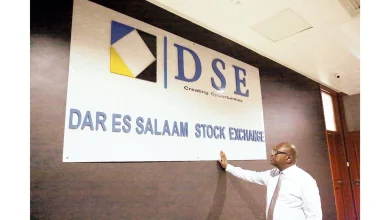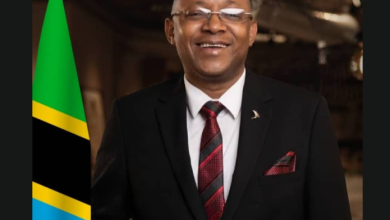Tanzania’s $2.8m grant sparks youth enterprise shift

DAR ES SALAAM: THE country’s youth entrepreneurship agenda has received a major lift through a 2.8 million US dollars grant under the international u’GOOD Programme, in a notable shift toward data-led policy making.
The five-year initiative, focused on advancing the social and economic well-being of young people across the Global South, places Tanzania among a select group of 23 countries implementing research projects that bridge academic insight with real-world impact.
The u’GOOD Programme (2023/24–2027/28) is a multi country partnership involving Switzerland’s Foundation Botnar, South Africa’s National Research Foundation (NRF) and the Human Sciences Research Council (HSRC).
The initiative is being implemented in partnership with the Tanzania Commission for Science and Technology (COSTECH).
It reflects a new, collaborative model of research that seeks to produce tangible, actionable outcomes, particularly in areas of youth employment, entrepreneurship, mental health and resilience in the face of climate and urbanisation challenges.
Speaking at the recent u’GOOD Conference in Dar es Salaam, which brought together participants from over 23 countries across Sub-Saharan Africa, Asia, Latin America and Europe, Dr Bugwesa Katale, Director of Research at COSTECH, said over 120 project proposals were submitted from various countries and only 23 were selected for funding.
“Tanzania managed to secure eight projects, which demonstrates the strong capacity and innovation of our researchers in addressing youth challenges,” said Dr Katale.
According to Dr Katale, Tanzania’s projects will target key development areas, including youth economic activity, climate vulnerability, small-scale enterprise and ways national development programmes can more effectively serve marginalised communities.
“The results of these studies will play a crucial role in improving social and economic policies related to youth, driving impactful change in employment, innovation and entrepreneurship,” he said.
The aim is clear: To leverage cutting-edge research to inform policy reform and develop solutions that enable young people to participate meaningfully in the economy—particularly in informal sectors like agriculture, fishing and small-scale trade, which dominate in periurban and rural areas.
The u’GOOD Programme’s approach is not just about academic research but about developing a real world, evidence-based blueprint for building sustainable youth entrepreneurship ecosystems.
The Chief Executive Officer and Founder of HD Consulting & Associates, Dr Hassan Mshinda, said that collaboration is the linchpin to success.
“We believe that real impact comes when we work together to tackle critical social issues. Beyond simply delivering services or support, our focus is on empowering people especially young people to participate meaningfully in the development ecosystem,” said Dr Mshinda, who was a former DG of COSTECH.
“We also have growing data on other forms of youth vulnerability, which guides how we shape our interventions,” said Dr Mshinda.
“Our role is to create space for young people to not only benefit from programmes like u’GOOD but to actively contribute to and shape them.”
ALSO READ: EABC: Address information barriers for youth enterprises
Dr Mshinda said innovation must go beyond technology, it must offer creative, community- rooted solutions that address the challenges youth face daily.
In a country where the majority of young people are either unemployed or underemployed in the informal sector, such policy interventions are long overdue.
“Tanzania is projected to have one of the fastest-growing urban populations in the world. Cities like Dar es Salaam are expanding rapidly and without proper planning and inclusive policies, we risk deepening inequality, poor health outcomes and youth marginalisation,” warned Dr Candice Groenewald, Chief Research Specialist at HSRC. She stressed that addressing these challenges requires collaborative, not siloed efforts.
“What we need is true collaboration between governments, communities, researchers and development partners to understand and respond to the priorities of urban populations.
“Our work should reflect not only how people receive services but how they actively contribute to shaping society,” she said.
Ardhi University (ARU) is one of the institutions spearheading the local research effort.
Dr Victoria Mwakalinga, a lecturer at ARU, says that their project aims to inform the design of inclusive policies for young people living in periurban areas who are often left out of mainstream development programmes.
“Many young people living on the outskirts of urban areas, or those migrating from rural regions, engage in small-scale economic activities such as fishing, agriculture, livestock keeping and informal trade,” said Dr Mwakalinga.
“These areas are becoming key settlement zones for youth and the research focuses on how such activities affect or are affected by climate change.”
ARU received 200,000 US dollars in funding for a three-year study. Dr Mwakalinga highlighted that two lecturers have already begun PhD studies under the programme.
“This is not just academic. It will help shape national policies on youth development. The findings will highlight both the challenges and opportunities these economic practices present in the context of environmental sustainability,” Dr Mwakalinga said.
According to Prof Sharlene Swartz, a senior researcher at HSRC, what sets u’GOOD apart from typical research efforts is its relational model.
Rather than working in isolation, teams from nine countries—Tanzania, South Africa, Vietnam, Ecuador, Colombia, Indonesia, Romania and others will collaborate in real time.
“It is not about ‘finding your voice’ alone. It is about building environments that meet young people’s needs and allow them to make a difference in the world,” said Prof Swartz.
“This is not the typical model where research is conducted in isolation. We are working to change the odds by creating environments that support connection, growth and well-being.”
Dr Dorothy Ngila, representing NRF, said the programme supports the longstanding bilateral relationship between Tanzania and South Africa in science and innovation.
“It reflects national priorities and aligns with goals for science and innovation that truly serve the people. It is about producing knowledge rooted in local ways of knowing,” she said.
“We must understand well-being from the perspectives of young people themselves. That’s how we shape systems that are inclusive, practical and sustainable.”
As Tanzania positions itself as a thought leader in youth-focused policy reform and social entrepreneurship, the outcomes of these research projects could redefine national approaches to job creation, digital innovation, climate resilience and social inclusion.
And for investors, policymakers and business leaders, the message is clear: Investing in youth is not just a social good it’s a strategic economic imperative.





